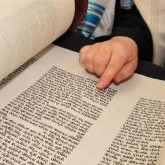
Religion

Freedom hopelessly inadequate without rules
JORDAN MOSHE
As South Africa moves through the COVID-19 pandemic, rules and laws have become increasingly important but equally frustrating. Our freedom to move, interact, shop, and exercise has been severely limited, the days of being able to do almost anything and go almost anywhere a happy memory.
The shift from boundless to boundaries seemingly parallels the progression from Pesach to Shavuot, from emancipation from Egypt to receiving a Torah full of restrictions. Similar though the two appear, however, the Torah given on Shavuot actually secures our freedom and helps us to understand the positive role of limitation.
“Torah, like its author, is eternal and is always informing contemporary life,” says Rabbi Yossy Goldman of Sydenham Shul in Johannesburg. “Our current situation is no different.
“From Pesach we move to Shavuot. Pesach represents our physical and political freedom. Shavuot represents our spiritual freedom, when we received the Torah, the mandate and mission of our Jewish way of life, from G-d.”
Goldman says that the Torah has lots of laws, many do’s and don’ts. However, the rubric of this pathway provides an infrastructure that gives us vision, perspective, and a moral code to guide us through the minefields of life.
Says Goldman, “Pesach and its political freedom without Shavuot and its moral, spiritual freedom would be hopelessly inadequate. The Jewish people would have been emancipated from Egyptian bondage, but they’d have been all dressed up with nowhere to go.
“Would we wander in the wilderness and flounder aimlessly with no end goal in sight? We might be physically and political free, but what would we do with our freedom?”
We need only look at our own country, he says. “Since the democratic dawn in 1994, we are all free, but the majority of the majority still don’t have access to employment, electricity, water, health, education, and remain disadvantaged, not previously disadvantaged.
“We need vision, purpose, a way of life, an intelligent infrastructure, and the wherewithal to be able to take advantage of our newfound freedom.”
Like the Torah’s rules and regulations, Goldman says that clear and cohesive guidelines are necessary, whether to give us direction in life, or to stop a virus pandemic in its tracks.
Rabbi Gabi Bookatz of Waverley Shul says there’s a critical distinction between liberty and freedom.
“Liberty is legal,” he says. “You’re at liberty to travel, and you have your rights. Freedom is an internal mindset, a spiritual space you’re in. Not everyone at liberty has freedom, and not everyone who is free has liberty.”
Bookatz says that during the years of Soviet Russia, the refuseniks (Jews in the Soviet Union who were refused permission to emigrate to Israel, and who protested the limitations of restrictive Soviet law) would say that they were the freest people in Russia.
“Though they had no liberty and were locked up in gulags, they were certainly free to think, free to be themselves and live up to their values without the imposing restriction of the communist regime.”
Conversely, it’s prevalent in the Western world today that people with the greatest liberty are the least free.
“People in America, for example, enjoy liberties like movement and religious affiliation,” says Bookatz. “These were unheard of in earlier times, and are things their ancestors could only dream of. Yet they are far from free.
“Rates of depression and anxiety are higher, people are lost, confused, and limited by societal pressures, politics, and their own desires. They have great liberty, but are certainly not free.”
We need to gain freedom before we gain our liberty, says Bookatz.
“Here we are, constrained in our homes and hoping to get back to normal life. The one thing we always have is the freedom of our minds to gain control, and such freedom we can find only in the Torah which gives us moral and ethical freedom, a clarity of direction.
“Freedom doesn’t mean anarchy,” he stresses. “Even freedom needs to be governed by certain guidelines, and these are the rules of the Torah.
“Rabbi Hirsch explains that the rules of the Torah facilitate moral freedom. When you commit to the highest moral codes, you’re no longer limited by your own ego and personal constraints. Such freedom is therefore only possible because of rules.”
Consequently, real talent is found when people learn to maximise their boundaries not remove them completely.
“If you operate within the framework of rules, that’s where genius and talent show themselves,” says Bookatz. “Sport shows this. It doesn’t take a genius to kick a ball, but it takes talent to do so within certain limitations.
“The same is true of art, music, and poetry. Strict guidelines need to be followed, and talent shows itself when you work within the system and display your abilities within a framework.
“It seems counterintuitive: we moved from the slavery of Egypt to being dominated by the rules of the Torah. However, Egypt made us an object directed only by someone else’s whims. The Torah enables us to be a subject, and this is freedom.
“It takes wisdom, maturity, and humility to see the freedom the Torah grants us, but such freedom ultimately helps us to be free of social pressures, politics, and our own desires.”




